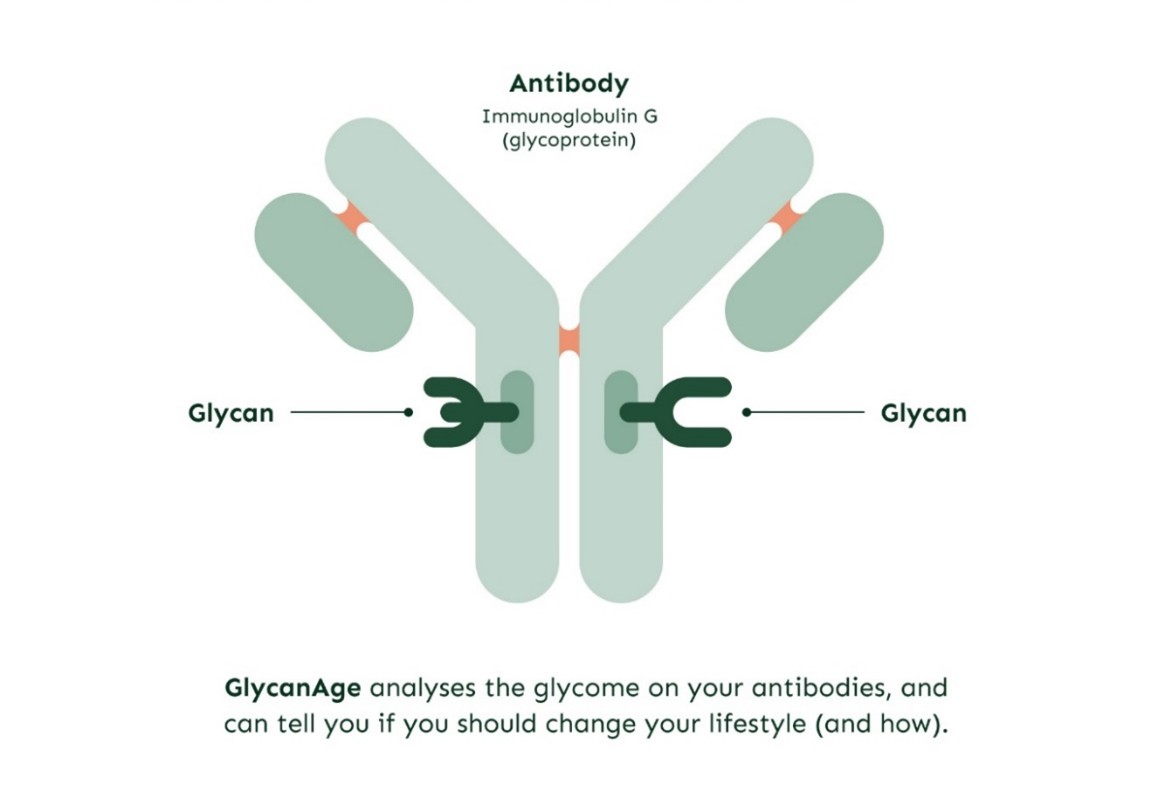Chronic inflammation test GlycanAge
An innovative blood test that determines biological age and chronic inflammation levels from the IgG glycan profile, revealing the impact of lifestyle (diet, sleep, stress, hormones) and providing personalized recommendations.
Longevity begins with an accurate assessment of biological age
Chronological age says nothing about how your body actually feels and functions. Biological age is mostly affected by chronic, unnoticeable inflammation, which accelerates aging and increases the risk of various diseases. The Chronic inflamation test analyzes IgG glycans – "indicators" of the immune system that show whether the body is in a more pro- or anti-inflammatory state.
Once you know your biological age and health indices, you will see how nutrition, sleep, stress, and hormonal changes affect your body, and you will be able to make targeted adjustments to your habits.
What does the Chronic inflamation test GlycanAge analyze?
The test evaluates the IgG glycan profile – the "indicators" of the immune system that regulate the balance between pro- and anti-inflammatory states. Excessive inflammation accelerates biological aging and increases the risk of chronic diseases, so changes in glycans allow this to be detected even before symptoms appear and interventions to be targeted accurately.
Biological age is an objective marker of chronic inflammation.
Inflammation balance – whether the immune system is more pro- or anti-inflammatory.
Lifestyle impact – how diet, sleep, stress, and hormonal changes (e.g., menopause) affect the glycan profile.
Risk insights – predispositions to cardiovascular, autoimmune, metabolic, and respiratory diseases.
Progress tracking – assessment of glycan dynamics by repeating the test every 3-6 months to see which measures are actually working for you.
Personalized longevity care: when your glycans dictate your decisions
IgG glycan analysis reveals your true inflammatory status and biological age before symptoms appear.
The report provides clear, science-based actions to help you make targeted lifestyle changes, reduce your risk of disease, and improve your well-being in the long term.
Personal action plan
The results are translated into specific recommendations for nutrition, physical activity, sleep, stress management, and micro/macro nutrient balance, tailored to your goals.
Clear report and indicators
You will receive clearly presented Glycan Shield, GlycanYouth, Glycan Mature, and supporting indices (e.g., Median, Bisection) with priority areas for change.
Early detection of chronic inflammation
Biological age and glycan indices help you identify risks in time and take preventive action before symptoms appear.
Lifestyle tips
Personalized advice – which areas to focus on and what adjustments to make.
When and for whom is the test recommended?
For those who want to objectively assess their biological age and inflammation level
You will receive a clear reference point before starting lifestyle changes.
For those seeking early detection of hidden inflammation
IgG glycan analysis helps to identify risks even before symptoms appear.
For those with metabolic risk factors
Excessive weight, high cholesterol, or glucose fluctuations – you will receive personalized guidelines for managing them.
For those at risk of heart, autoimmune, or respiratory diseases
Insights into your inflammation balance help you develop a prevention plan.
"When I first took the Chronic inflamation test GlycanAge, I was on a keto diet and exercising intensively for 8 hours a week. My biological age was 8 years older than my actual age. Looking at the test results, I learned which areas of my life and health I needed to focus on to improve my health, chronic inflammation levels, and biological age. I added more lean animal protein and various fruits and vegetables to my diet; I reduced my intermittent fasting time and adjusted my training regime.
By consistently following my new habits, my biological age has decreased by 17 years and has remained low to this day. I realized that even disciplined regimes can have the opposite effect if they are not in tune with our biology. Research into healthy longevity helped me optimize both my diet and my training - achieving results that have lasted for a long time."
The reliability of Chronic inflamation test: accuracy and quality figures
IgG glycan analysis has a solid scientific basis – these markers reflect the balance of inflammation in the immune system and allow for an objective assessment of biological age and chronic inflammation risks.
> 30 years of scientific research
> 300 scientific publications on glycans
Methodology for determining biological age published in 2013 (Krištić J. et al.)
Biologically based longevity plan
Order a Chronic inflamation blood test GlycanAge and find out your biological age and inflammation balance.

For specialists
All relevant information in one place – from the genes analyzed to the accuracy and clinical value of the test. This section is intended for specialists who want to understand the basis, structure, and practical application of the test in detail.

IgG is the most abundant antibody in the blood. Glycans attached to its structure regulate the activity of the immune system and maintain the balance between pro-inflammatory and anti-inflammatory states. This balance is directly related to the body's aging processes and long-term health.
Excessive levels of pro-inflammatory glycans are associated with an increased risk of autoimmune, cardiovascular, metabolic, and respiratory diseases. Changes in these markers help to identify risk profiles in a timely manner and plan preventive interventions.
Human glycomics change due to many factors and, in some cases, can change up to 10 years before the onset of disease or hospitalization. Due to this dynamics, glycan analysis acts as an early warning tool, allowing to prevent disease and take preventive action.
The test evaluates biological age as an accurate marker of chronic inflammation and calculates glycan indices. The primary indices are Glycan Shield and Glycan Youth, which reflect the anti-inflammatory state, and Glycan Mature, which indicates the pro-inflammatory direction. The supporting indices, Glycan Median and Glycan Bisection, are most sensitive to lifestyle changes and help reveal their impact on health.
The results help to individualize preventive medicine solutions, tailoring them to the needs of the specific patient. The physician can objectively monitor the patient's response to treatment or lifestyle changes and, if necessary, combine this test with other laboratory tests to see overall health trends.










